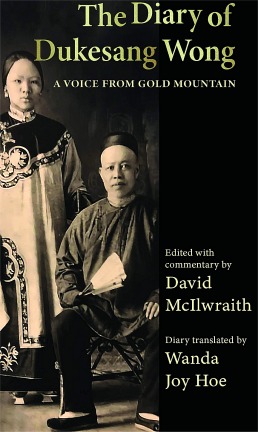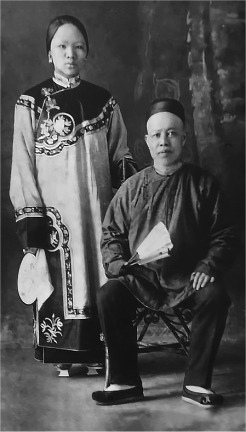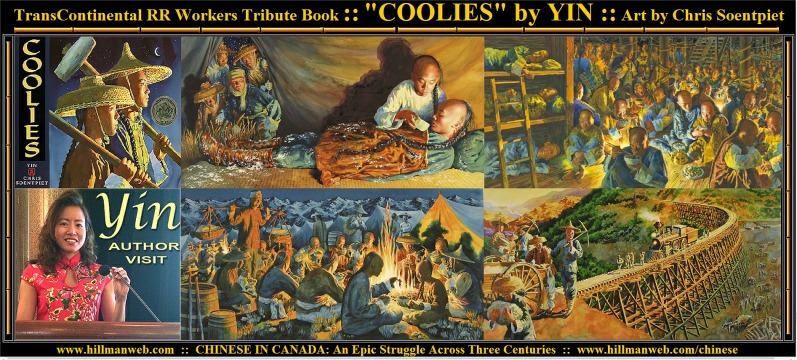THE DIARY OF DUKESANG WONG restores a
lost central voice to a foundational episode in Canadian history -- one
that changes our understanding of the history it recounts. Dukesang Wong's
remarkable diary tell of the appalling conditions, the punishing work,
the camaraderie, the sickness and starvation, the encounters with Indigenous
Peoples, and the shameful history of racism and exploitation he and his
fellow Chinese workers endured while constructing the treacherous British
Columbia section of the Canadian Pacific Railway.
The Diary of Dukesang Wong also places this segment of
Canadian history into context, as one part of Wong's gradual, painful establishment
of a new life in a new land. His diary traces the unfolding of that remarkable
life, from his early years in unstable China, to his decision to emigrated
to "the Land of the Gold Mountains," to becoming a tailor in New Westminster,
and finally to the joys of family life. As Judy Fong Bates writes in her
introduction, "His diaries give him back his humanity and hs individuality.
. . It is a heartbreaking, but ultimately hopeful, voice that reaches out
beyond the century."
"The Diary of Dukesang Wong is a poignant story of how
life's many harsh realities repeatedly test the human spirit. Wong's voice
brings to light the haunting chronicles of thousands of Chinese people
in North America who suffered immensely in an inhospitable, racist society."
~ Jenny Kwan, MP for Vancouver East

THE DIARY OF DUKESANG WONG
Diary of Chinese Rail Worker A Wonder
(Adapted From) A Review by: Ursula Fuchs ~ Winnipeg
Free Press
This book’s dedication says it all: To the faces
not in the picture.
The only first-hand account by a Chinese railroad worker
known to exist in all of North America ( "Gold Mountain" to those early
immigrants), the story of how The Diary of Dukesang Wong came to light
is as interesting as the journal itself. Because of the brutal and transient
nature of their work, their appalling wages, their poor health, their frequent
illiteracy and their being periodically burned out of their homes, those
who were at the time known as "coolies" have remained largely voiceless
and faceless in Canadian history.
They're conspicuously absent, for example, from photos
celebrating the completion of the Canadian Pacific Railway in 1885. The
staggering feat of bringing the railway through the mountains to the West
Coast could not have been accomplished without their contribution; other
than oral history recordings, however, their own perspective has been profoundly
lacking. This unique document could have been lost forever if Wanda Joy
Hoe hadn't decided to translate portions of her grandfather's diary (her
translation all that remains of the original) for a university course,
if author McIlwraith hadn't adopted a daughter from China, if a single
quote in an unmarked drawer hadn't been discovered.
Dukesang Wong, 21 years old in 1867 and classically educated
in the teachings of Confucius, began keeping a diary during a troubled
time. His father, an Imperial court magistrate, had recently been poisoned,
the entire family dishonoured and shunned, his future made precarious.
Trying to regain his family's good name in China became a lifelong but
futile endeavour for Wong, though by 1918, when he wrote his last diary
entry, he was a family man in his 70s, a highly respected member of British
Columbia's Chinese community.
His account of the intervening years reveal a truly hardy
soul. It's a portrait of restlessness leading to emigration, first impressions
of a "barbaric" land where he and his compatriots routinely face contempt,
and dreams of his promised bride fueling his need to save money and accept
harsh physical work. Wong’s compassionate presence, along with an indictment
of his employers, comes through loud and clear in Hoe's translation, most
indelibly as he describes his skeletal co-workers, driven to keep up their
mad pace despite winter conditions and illness.
For McIlwraith, this is an obvious labour of love, presenting
carefully researched background material in a colourful way.

AMAZON.CA
DESCRIPTION:
Here is the only known first-person account from a Chinese
worker on the famously treacherous parts of transcontinental railways that
spanned the North American continent in the nineteenth century. The story
of those Chinese workers has been told before, but never in a voice from
among their number, never in a voice that lived through the experience.
Here is that missing voice, a voice that changes our understanding of the
history it tells and that so many believed was lost forever.
Dukesang Wong’s written account of life working on the
Canadian Pacific Railway, a Gold Mountain life, tells of the punishing
work, the camaraderie, the sickness and starvation, the encounters with
Indigenous Peoples, and the dark and shameful history of racism and exploitation
that prevailed up and down the North American continent.
The Diary of Dukesang Wong includes all the selected entries
translated in the mid-1960s by his granddaughter, Wanda Joy Hoe, for an
undergraduate sociology course at Simon Fraser University in the mid-1960s.
Background history and explanations for the diary's unexplained references
are provided by David McIlwraith, the book’s editor, who also considers
why the diarist's voice and other Chinese voices have been silenced for
so long. ~ Amazon.ca
 .
.

